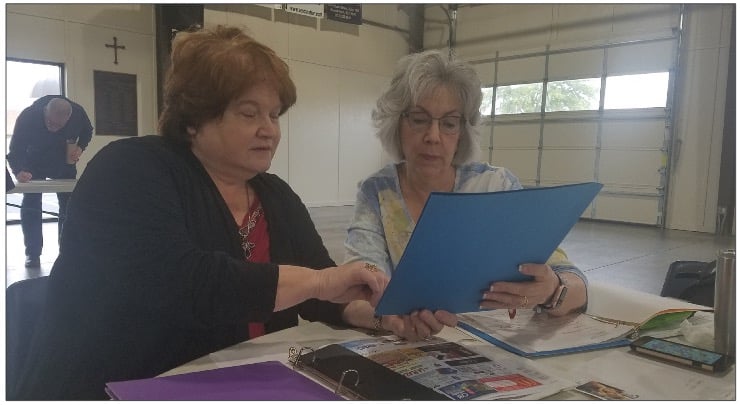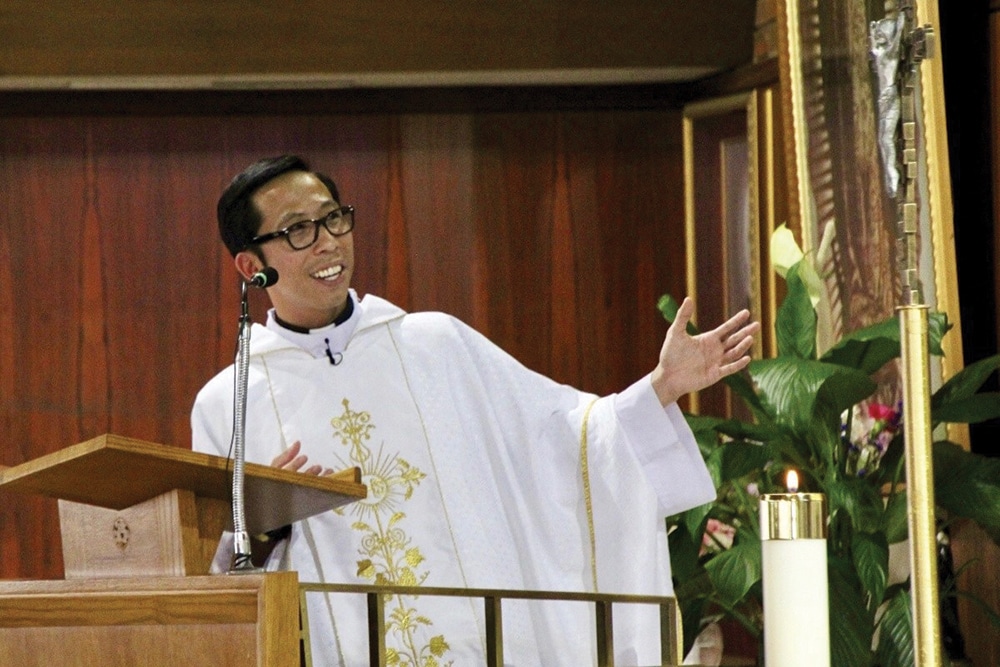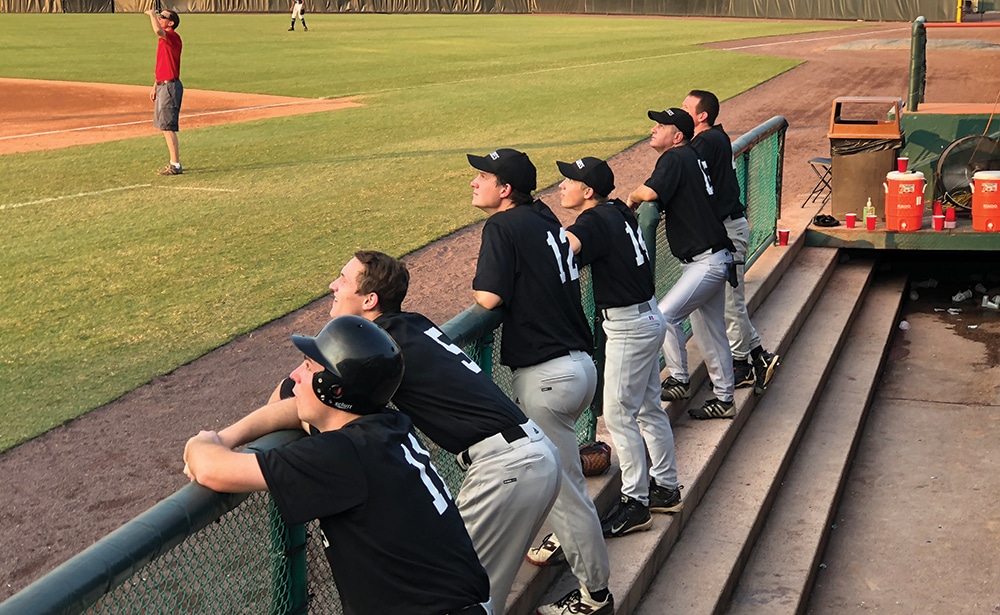By virtue of baptism, all Christians are called to evangelize, to spread the Good News of Jesus Christ.
Over the last few decades, popes have recognized that the time has come for a New Evangelization, a sort of reproposing of the Gospel to the world of today.
 During a homily in 2010, Pope Benedict XVI said that the Gospel needed to be reproposed for the “regions of the world that are still awaiting a first evangelization; others that have received it, but need a deeper intervention; yet others in which the Gospel put down roots a long time ago, giving rise to a true Christian tradition but in which, in recent centuries with complex dynamics, the secularization process has produced a serious crisis of the meaning of the Christian faith and of belonging to the Church.” The same can be said about members of parishes throughout the country: A new fire needs to be lit under them, and the face of Jesus needs to be contemplated with fresh eyes.
During a homily in 2010, Pope Benedict XVI said that the Gospel needed to be reproposed for the “regions of the world that are still awaiting a first evangelization; others that have received it, but need a deeper intervention; yet others in which the Gospel put down roots a long time ago, giving rise to a true Christian tradition but in which, in recent centuries with complex dynamics, the secularization process has produced a serious crisis of the meaning of the Christian faith and of belonging to the Church.” The same can be said about members of parishes throughout the country: A new fire needs to be lit under them, and the face of Jesus needs to be contemplated with fresh eyes.
The Church in the United States is going through tough times, and this is causing many people to be shaken from their metaphorical stupor into a fresh examination of the Faith. What are some ways for the Church to be innovative in evangelization at the parish level?
Led by the Spirit
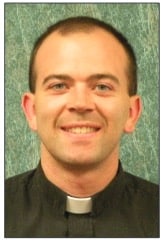
Father Drew Curry is the pastor of St. Robert Bellarmine Church in North Manchester, Indiana. When it comes to being innovative in evangelization at the parish level, Father Curry cautions against trying too hard to be relevant.
“It really should all be put in the hands of God,” he said. “It’s not so much about crafting a program or something like that, so much as begging the Lord to send the Holy Spirit and raise up people in the parish to be witnesses.” The witness of individuals at the parish level can have the greatest effect among other parishioners.
One way in which members of the parish serve as witnesses is through involvement in the Cursillo movement, which involves three-day retreats that are intended to show lay Catholics how to be effective leaders and evangelizers. Father Curry encourages parishioners at St. Robert Bellarmine to attend these Cursillo weekends.
“It has been really fruitful to get people out of the parish and doing something they wouldn’t have done themselves,” Father Curry said.
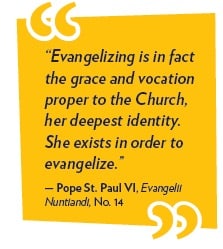 Father Mathias Thelen also has been an inspiration for the parish. A priest of the Diocese of Lansing, Michigan, Father Thelen encourages prayer to the Holy Spirit for healing. St. Robert Bellarmine has begun a monthly Holy Spirit Healing Night, during which people gather for Eucharistic adoration, praise and worship, a short talk and praying over each other. These nights have been “amazingly fruitful,” Father Curry said, yielding spiritual, mental and physical healings. Father Curry began these nights at the parish after attending the Encounter Conference, put together by Encounter Ministries.
Father Mathias Thelen also has been an inspiration for the parish. A priest of the Diocese of Lansing, Michigan, Father Thelen encourages prayer to the Holy Spirit for healing. St. Robert Bellarmine has begun a monthly Holy Spirit Healing Night, during which people gather for Eucharistic adoration, praise and worship, a short talk and praying over each other. These nights have been “amazingly fruitful,” Father Curry said, yielding spiritual, mental and physical healings. Father Curry began these nights at the parish after attending the Encounter Conference, put together by Encounter Ministries.
“I felt like I was jumping off a cliff,” he said. “I thought people were going to think I was crazy. But the first night, there was a lady who got healed of her bursitis. And I was like, ‘OK — game on.’
“Father Mathias and Encounter Ministries have really helped show me that healing and evangelization really go hand in hand,” Father Curry said. “Jesus, when he was doing his ministry, would preach and teach and then would do miracles to show them that what he was saying was true.”
For Father Curry, there is something intrinsically evangelical about healing ministry, following the example of Jesus Christ and the apostles. There is a personal touch that is involved that makes evangelization feel like more than simply an academic exercise.
“If we really want to evangelize, we have to go back to the Gospels and look at what Jesus was saying and doing,” Father Curry said. “And what were the first disciples doing in the Acts of the Apostles? We shouldn’t expect that the New Evangelization is going to look much different.”
At its core, the New Evangelization is trying to do what the first disciples did. “And I think a lot of people think the New Evangelization is all about Twitter, Facebook and Instagram, and branding, and being excited, and helping people come along, and that’s really going nowhere,” Father Curry said. “So at the core of it, we have to actually all swallow our pride and do what the first Christians did to spread the Gospel.
“When we evangelize, we really should be doing things like healing and praying for miracles for people,” he said. “Without the experience, people often aren’t really that interested.”
This evangelization is where the Church’s work must be done, he said. “We spend so much time on glossy everything — internet, social media, looking cool. [The Holy Spirit Nights] have been way more fruitful than anything else I’ve put my attention on or tried to do.”
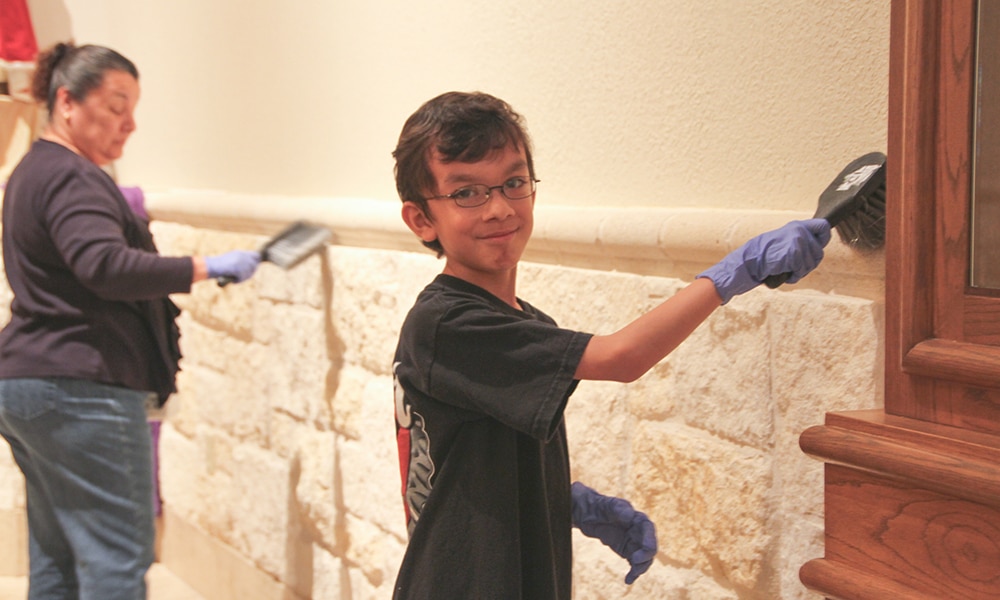
There is another recommendation Father Curry makes that too often is neglected in parish life. “It’s important for the pastor and the parish to know the parish boundaries,” he said. “Not because people need to go to church within their boundaries, but it’s helpful for the pastor to know all the places within his boundaries that he is supposed to evangelize.”
In Father Curry’s case, he does college ministry at Manchester University, as it is within the boundaries of his parish, and he is looking into how to grow a Newman Center or something similar.
On a few occasions, Father Curry has attended the university’s normal Bible study night and led a Holy Spirit Night. “So instead of just a little social Bible discussion, they were overshadowed by the power of God,” he said. He wants to integrate this more into the regular schedule of the group — “something experiential where they become aware that there is the power of God at their disposal if they want to invite him in.”
Teaching those in the pews
“People need saving, and there’s only one who can save,” said Tommy Dome, director of evangelization at St. Basil the Great Parish in Brecksville, Ohio. This, he said, is why evangelization is important. “Of course, part of the problem is that many are unaware that there is anything we need to be saved from.”
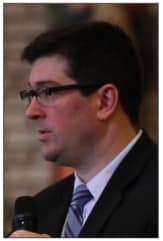
Evangelization is not just for the unchurched, those who are either not members of a church or who do not regularly attend. Those in the pews every week need to be evangelized as well. This is certainly for the sake of their own souls, but there is a mission and sending-out element to this. “We have to evangelize those people in the pews because our priests and pastoral staff work at our parish and not at stores, offices or factories — but luckily our parishioners do,” Dome said. They need to be evangelized so that they can go out and evangelize others.
“Once they have sat at the foot of the Master and learned his discipline, they are disciples,” Dome said. “After that, they must become apostles and be sent out to help bring more people into the Church who can become disciples, and in turn apostles, and so on.”
Dome said that parishes need to improve the way in which they communicate the importance of evangelization to people and better train them to evangelize “with the witness of their lives and invite others with the words of their mouths.” It is also important, he said, to offer events to which it would be easy to invite someone — the sort of events that someone would be interested in coming to even if they have had no exposure to the Catholic faith.
In Dome’s attempts to be innovative in evangelization efforts at St. Basil, he had a humbling experience. “I thought I had an innovative idea, only to find out later that it was already laid out in the GIRM [General Instruction of the Roman Missal], Section 105b,” he said. This section deals with the idea of a commentator providing restrained and appropriate explanations and exhortations during the liturgy. “It provided a good dollop of humility.”
The role of the commentator was formerly used to acclimate the faithful to the changes in the Mass following the Second Vatican Council, but has since been mostly forgotten or deemed unnecessary. At St. Basil, they use this role to explain one liturgical action or symbol each week. Before every Mass, Dome speaks for two to three minutes on the meaning behind such things as the sanctuary, altar, tabernacle, triple Sign of the Cross before the Gospel, chasuble, genuflecting and more.
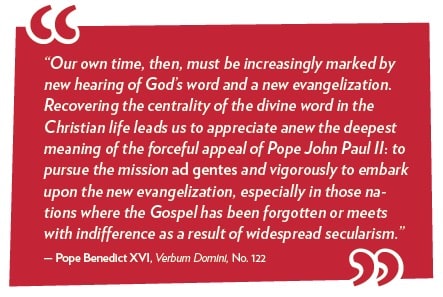 “The response thus far has been nothing short of astounding,” he said. “Parishioners have not been shy to come up to me and admit that they had no idea why we do the things that we do. There is a great hunger for meaning.” This is one of the greatest insights Dome and others have had in the context of parish evangelization: Many people in the pews do not even know why Catholics do what we do. This is the place to start in evangelization. Even for these two-minute reflections, Dome spends about 4-5 hours each week researching, writing, praying and memorizing so that the explanation can be delivered clearly, concisely and compellingly.
“The response thus far has been nothing short of astounding,” he said. “Parishioners have not been shy to come up to me and admit that they had no idea why we do the things that we do. There is a great hunger for meaning.” This is one of the greatest insights Dome and others have had in the context of parish evangelization: Many people in the pews do not even know why Catholics do what we do. This is the place to start in evangelization. Even for these two-minute reflections, Dome spends about 4-5 hours each week researching, writing, praying and memorizing so that the explanation can be delivered clearly, concisely and compellingly.
“Our people deserve the best we can give,” he said. “I consider it a great privilege and responsibility to be able to speak to a few thousand people each week to try to help them have a deeper encounter with God at Mass.”
There certainly are challenges that arise in trying to be innovative. In the case of St. Basil, Dome said the fact that the parish is blessed with great clergy and devoted members can be an obstacle to innovation.
“I believe we are in a major crisis in American Catholicism,” he said, “but a highly involved rock-star parishioner at a great parish might not see it that way. If we are to believe the storehouses of recent data on American Catholics, we have to start acting like these are drastic times. Of course that doesn’t mean putting dogma or doctrine on the table, but it does mean re-examining most everything else that we do have control over.”
Dome said that sometimes it is necessary to engage in a sort of cleansing, eliminating the things that are not necessary. “Maybe it’s just part of my personal spirituality,” he said, “but I am very big on slaughter. And I put it that way on purpose. So many times in my life, I had to purposely put something to death so that something new could come to life. We got rid of our TV, and only then did I read the whole Bible cover to cover. I got rid of my smartphone, and only now do I write a personal note every night to put in my daughters’ lunch boxes.”
It is the same in Church ministry, he said. In order to intentionally make room and opportunity for the important things, we need to clear out the clutter.
“Powerful new outreach will arise after we have the courage to place some of our old methods and activities on the altar of sacrifice,” he said. “That is always hard to do, but if we can convince our people of a vision and the mission to accomplish that vision, then most will join in the renewal.”
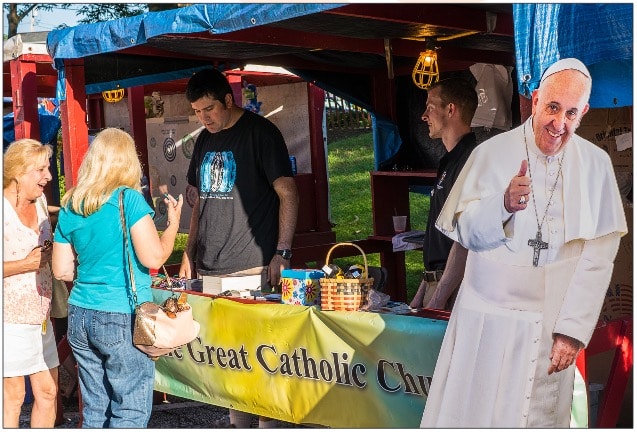
‘Ministerial conscience’
“Evangelizing people creates change,” said Tommy Sustaita, volunteer coordinator at St. William Catholic Church in Round Rock, Texas. This change does not consist so much in what we do in life, but in how we live our lives, he said. “As a result, this change becomes a living witness among others. It’s contagious and noticeable, which flows out into viable settings of social structures including family life, church, politics.”
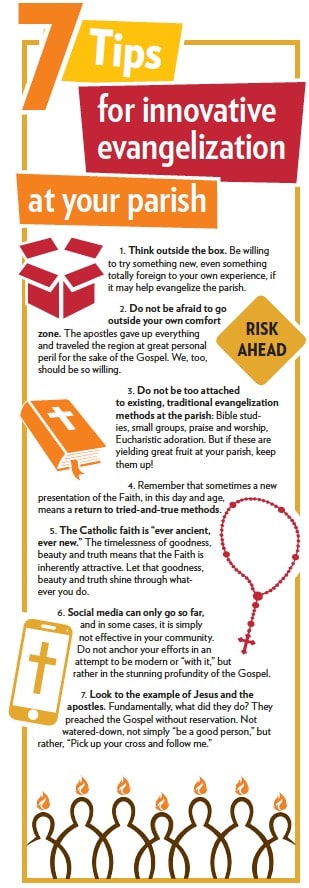 Sustaita has been a staff member at St. William for 16 of the last 22 years. He has served as a youth minister, director of religious education and as volunteer coordinator. This experience has given him a great and broad sense of parish life and different types of parish evangelization.
Sustaita has been a staff member at St. William for 16 of the last 22 years. He has served as a youth minister, director of religious education and as volunteer coordinator. This experience has given him a great and broad sense of parish life and different types of parish evangelization.
“It’s important to evangelize all people in order to build the kingdom of God — a kingdom of redemption and love which brings the entire world to Jesus Christ,” he said. “This is the Good News that unites us!”
Sustaita said that evangelization is the apostolic mission of the Church, and it requires us to modify our passive attitudes about a life in Christ. It must be a life actively lived, seeking out Christ and spreading the Gospel.
“Furthermore, it is quite possible that evangelization introduces people to a real relationship with him [God] even for those who sit in our pews every Sunday,” Sustaita said. “The spread of the Good News announces the loving actions of Jesus Christ and serves as a living testimony for all through word and deed.”
At St. William, Sustaita and others work to answer the call to evangelize. “St. William has a heart for service and a love for the Triune God,” he said. “This is a very important component when speaking about parish evangelization.”
Among the parishioners, the fundamental groundwork is present, and staff members build a framework of ministry that is intentional and responsive to the community’s needs.
“We can’t give everything to everyone, but we can certainly minister collaboratively with parishioners and direct people toward four functions of parish life: fellowship and service, evangelization and mission, prayer and worship, faith formation and education,” Sustaita said. This framework is intended to help the participant develop a profound relationship with Jesus Christ through the Holy Spirit.
“This intentionality, a ministerial conscience, is innovative,” Sustaita said. “For example, during liturgies in the sanctuary and fellowship in the narthex, parishioners and guests are cared for by teams of volunteer leaders that work on specific components of the ‘Sunday experience.'” Extraordinary ministers of holy Communion, ushers and others are trained to guide others toward a positive celebration at the Mass with a focus on Jesus Christ.
There is also an element of discernment when it comes to volunteering at the parish and guidelines for potential volunteers. When people come to inquire about serving or volunteering in some way at the parish, they are invited to sit and discern. The previously mentioned four functions of parish life are discussed, time commitments and availability are evaluated, all within the perspective of Catholic stewardship, Sustaita said.
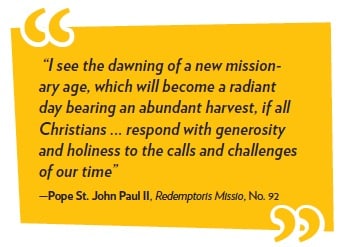 “We aim to service-match parishioners with qualified volunteer leaders instead of hoping a potential volunteer finds their way with 125 ministries,” he said.
“We aim to service-match parishioners with qualified volunteer leaders instead of hoping a potential volunteer finds their way with 125 ministries,” he said.
One of the primary challenges Sustaita sees in attempting to be innovative in evangelization is apathy. “It is always hard to do something new,” he said. “Apathy is the nemesis of creative ministerial work.” Distraction is another stumbling block. “Momentum gets stalled when we get distracted. Movements away from the Gospel message only keep us B.U.S.Y. (Being Under Satan’s Yoke) in the Church.”
Related to these obstacles is a third: fear. “There are many times when I engage parishioners or potential volunteers, I sense a fear of vulnerability, spirituality, reconciling or being accountable,” Sustaita said.
The New Evangelization necessitates a certain degree of innovation, while getting back to the roots of Christian evangelization. In a day and age where seemingly every effort toward evangelization involves modern technology or trends, the real innovation seems to be getting back to the core of preaching the Gospel of Jesus Christ.
